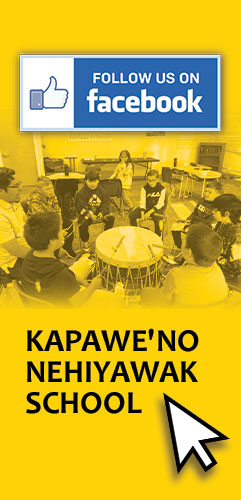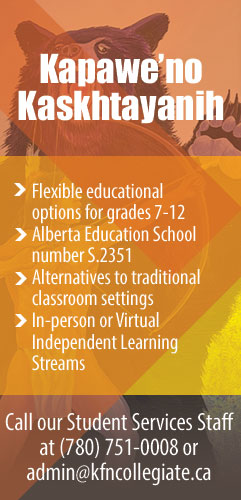ABOUT FIRST NATION COLLEGIATE
First Nation Collegiate, has three pillar schools and is accredited both in western studies and the Nêhiyawak Pimachihowin (way of life). Our programs we specialize in include Nêhiyawêwin (Cree Language) Isihcikewin (to know for yourself) arts, sciences, music, sports and Nêhiyawak Pimachihowin. With state-of-the-art technology, we build upon the technological advances of Kapawe’no Nêhiyawak School (K-6), Buffalo Bay Academy (7-12), and First Nation Virtual Learning Centre (FNVLC) while focusing on higher learning standards.
Our Teachers at our schools play a pivotal role in shaping the young minds of our Nation. Entrusted with the responsibility of imparting knowledge and instilling pride in our Nêhiyawak Pimachihowin, they seamlessly integrate Nêhiyawêwin Isihcikewin and teachings into the academic framework.
Recognizing the schools dual mission of academic excellence and Nêhiyawêwin, the teacher ensures that every lesson resonates with the spirit of our ancestors, while also equipping students with the skills and knowledge required for the modern world. Through their dedication, they uphold the school’s commitment to fostering both a profound love for Nêhiyawêwin and a deep, enduring appreciation for our rich Nêhiyawak Pimachihowin.
POSITION PURPOSE
The Teachers at First Nation Collegiate will be responsible for delivering a comprehensive education that seamlessly integrates Nêhiyawêwin and Nêhiyawak Pimachihowin with academic content. The teacher will uphold the Collegiate’s mission in fostering a love for Nêhiyawêwin and a deep appreciation for Nêhiyawak Pimachihowin.
KEY RESPONSIBILITIES
Curriculum Development & Delivery
- Lesson Creation: Design lesson plans that uniquely combine the wisdom of traditional Nêhiyawak teachings with today’s educational benchmarks.
- Flexible Teaching: Tailor lessons dynamically according to the Nêhiyawêwin styles of students, ensuring every individual grasps the content.
- Interdisciplinary Approach: Seamlessly integrate various subjects, emphasizing the relevance of Nêhiyawak Pimachihowin.
Nêhiyawêwin Isihcikewin
- Daily Integration: Incorporate Nêhiyawêwin Isihcikewin at the teachers circle and online every morning, creating a natural environment for its usage and fostering habitual speaking among students and other teachers / staff.
- Nêhiyawêwin Activities: Plan and execute language immersion events, such as storytelling sessions or cultural games, to enhance Nêhiyawêwin fluency.
Nêhiyawêwin Integration into Curriculum
- Subject Collaboration: Work closely with our Keepers to ensure Nêhiyawêwin is effectively integrated across various academic disciplines.
- Experiential Nêhiyawêwin: Plan field trips or hands-on sessions, such as visits to Nêhiyawak cultural landmarks or participation in traditional ceremonies, to provide students a tangible experience of Nêhiyawêwin.
Student Assessment
- Culturally-Resonant Tools: Use assessment tools that resonate with Nêhiyawak Pimachihowin to ensure evaluations are both relevant and fair.
- Parental Involvement: Schedule regular meetings with parents or guardians to keep them informed about their child’s academic and linguistic progress.
Classroom Management
- Inclusive Environment: Foster a classroom culture where students feel safe and encouraged to share and express their identities.
- Cultural Mediation: Proactively address and resolve any misunderstandings or conflicts, ensuring all students feel valued and respected.
Professional Development
- Continuous Nêhiyawêwin: Attend workshops internally and seminars that offer insights on integrating Nêhiyawak Isihcikewin in contemporary Nêhiyawêwin settings.
- Peer Engagement: Take the initiative to either lead or actively participate in group discussions with peers, exchanging innovative teaching strategies pertinent to Nêhiyawak Pimachihowin.
Collaboration
- Nation Engagement: Partner with fellow educators to plan and execute lessons or projects that highlight Nation-based Nêhiyawêwin and shared experiences.
- Elder Knowledge Keeper Collaboration: Establish strong ties with our Elders Knowledge Keepers, inviting them for insightful guest sessions or workshops.
Technology in Teaching
Using indigenousedu.com for Virtual Nêhiyawêwin Transformation:
- Implement Indigenousedu.com to revolutionize the classroom experience, seamlessly transitioning between in-person and virtual Nêhiyawêwin environments.
- Utilize Indigenous.com’s robust platform to create dynamic, interactive, and culturally rich online Nêhiyawêwin sessions, ensuring students remain engaged and connected, regardless of their physical location.
- Develop and curate digital educational resources, leveraging Indigenousedu.com’s capabilities for enhanced collaboration, communication, and resource sharing.
- Train and encourage students in the proficient use of Indigenousedu.com, fostering technological fluency alongside traditional Nêhiyawêwin.
- Employ Indigenous.com’s tools for monitoring and assessing student progress in virtual settings, ensuring Nêhiyawêwin consistency and quality are maintained.
Teacher Evaluation
Receiving and Utilizing Evaluation Feedback:
- Teachers will regularly receive evaluations based on student feedback, classroom observations, and student Nêhiyawêwin outcomes.
- Evaluations will be crafted to respect both Nêhiyawak Pimachihowin principles and contemporary educational standards, providing a balanced view of teaching effectiveness.
- Teachers are encouraged to actively engage in self-evaluation and reflection, using evaluation feedback as a tool for professional growth and enhancement of teaching methods.
- Feedback from parents, Nation citizens, and educational peers will be included in evaluations to give teachers a comprehensive understanding of their impact.
- Teachers will have scheduled bi-yearly performance review sessions with the Principal of the school(s) to discuss evaluation results, focusing on areas such as curriculum delivery, student engagement, and the integration of Nêhiyawak Pimachihowin into teaching.
KEY QUALIFICATIONS
- Bachelor’s Degree in Education or a related discipline western or within the Nêhiyawak Pimachihowin.
- Proficiency in Nêhiyawêwin or a commitment to achieving fluency.
- Knowledge of Nêhiyawak teaching methods and practices.
- Previous teaching experience, preferably in Nêhiyawak Pimachihowin.
- Experience in technology and online teaching platforms.
- Able to use video, record lessons and enhance learning abilities within the classroom and online.
PERSONAL ATTRIBUTES
- A passion for Nêhiyawêwin Isihcikewin.
- An innovative, responsive and well balanced teaching approach.
- Excellent interpersonal and communication skills.
- Ability to work collaboratively with staff, students, and the Nation.
Last modified: May 8, 2024



